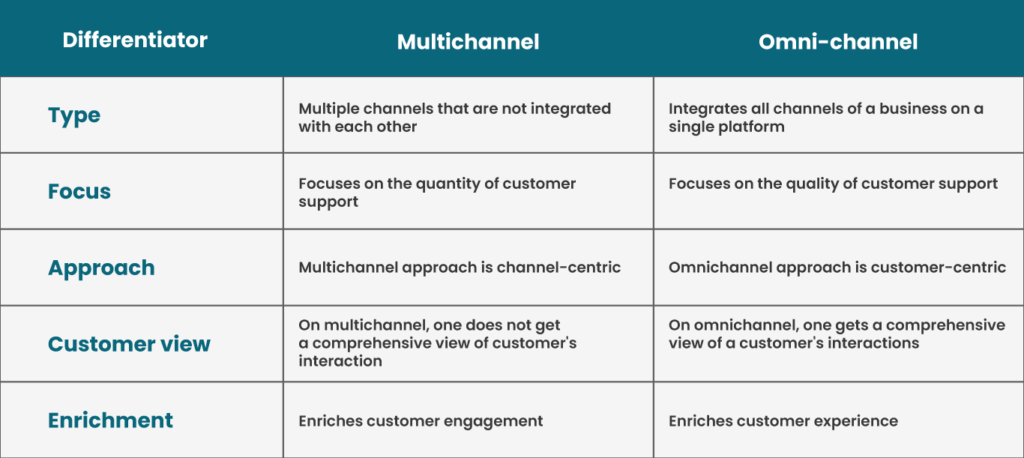To efficiently reach one’s customer in today’s world is to be wherever your customer is likely to interact with your brand. This means brands need to use multiple channels for engagement with their customers.
Therefore businesses need to be present on various channels to have easy access and be approachable to customers. Typically, in business models, there are two types of approaches to creating a strategy for communication channels. The approaches are multichannel and omnichannel approaches.
Table of content
What are omnichannel & multichannel support?
Multichannel approach
A multichannel approach is when a brand has more than one channel for its customers to engage with or continue their journey through. Multichannel customer service is when customers put in the effort to reach out to a brand through specific available channels.
Omnichannel approach
An omnichannel approach would mean integrating all forms of communication a brand provides within a single system. Omnichannel is not just multiple channels where customers can engage but also the one where all channels work in tandem and track the customer journey.
This would give the customer a personalized experience as they can pick up from where they left off. Customers would see the brand represented through one holistic voice and not various channels.
Build a better omnichannel experience for your customers with Knomwax
Let’s connect
4 reasons why the omnichannel approach is better for your business
The omnichannel customer service strategy is new, while multichannel is slowly taking a back seat. The difference between these two is nothing but the ideology that an organization wants to adopt. Following are reasons that might convince you to switch to omnichannel customer support:
1. Tracking customer journey
Customer journey means tracking a customer’s footprints, from when a person shows interest in the product to taking feedback or providing customer service for the same product.
Following a customer’s journey is important because it tracks customers’ interaction with the brands, their likes, and dislikes and helps provide a personalized experience to them. This makes the customer feel valued and saves precious time during customer support for quick resolutions for any query.
2. Connects online and offline experiences
Say a customer purchased a product at an offline store and needs help setting it up. When the customer calls for assistance, customer service executives can track the customer’s journey by just entering their contact details. So, the omnichannel approach helps pick up where a customer has left off, online or offline. This allows customers to have a seamless experience across all channels.
3. Consistent customer experience
With an omnichannel approach, you aren’t just focusing on the customer’s engagement but also the experience they are having with your product and services from the start of their journey to the end. Maintaining consistency would create a good impression of your brand values and might help to retain customers. A multichannel approach might not be the same as it lacks consistency across platforms.
Provide seamless and consistent customer experience with Knomwax KM system
Request a complete demo4. Better customer retention rate
By being omnipresent, you can improve your customer retention rate as customers can purchase from your business at the channel of their convenience and not from the channel you choose for them. According to Mgage, there is a 13% customer retention improvement when an omnichannel strategy is implemented.
How to be omnichannel ready at your organization?
If a business is shifting from a multichannel to an omnichannel approach? One does not need elaborate software for omnichannel customer support if one has a robust, AI-backed knowledge management platform, like Knowmax.
The Knowmax knowledge management system makes tracking a customer journey and providing customer support extremely easy.
Here’s how it works
- This knowledge management platform integrates with an organization’s existing CRM platform
- Enables easy access to the customer’s journey and improves the redundant collection of the customer’s journey at every purchase stage
- A knowledge management platform serves as a platform for a single source of truth, which means all knowledge repositories are in one place
- With easy dissemination of information from one source across all platforms at the customer front, it reflects the same information across all organization channels
- This leads to consistency of information or data across all customer touchpoints
Conclusion
As an organization, you might be skeptical about having omnichannel customer service when you already provide a multichannel experience. You need to know that even if you keep your customers engaged now, enhancing their experience helps improve customer satisfaction, build loyalty, and retain customers in the long run.
 6 Min
6 Min
















